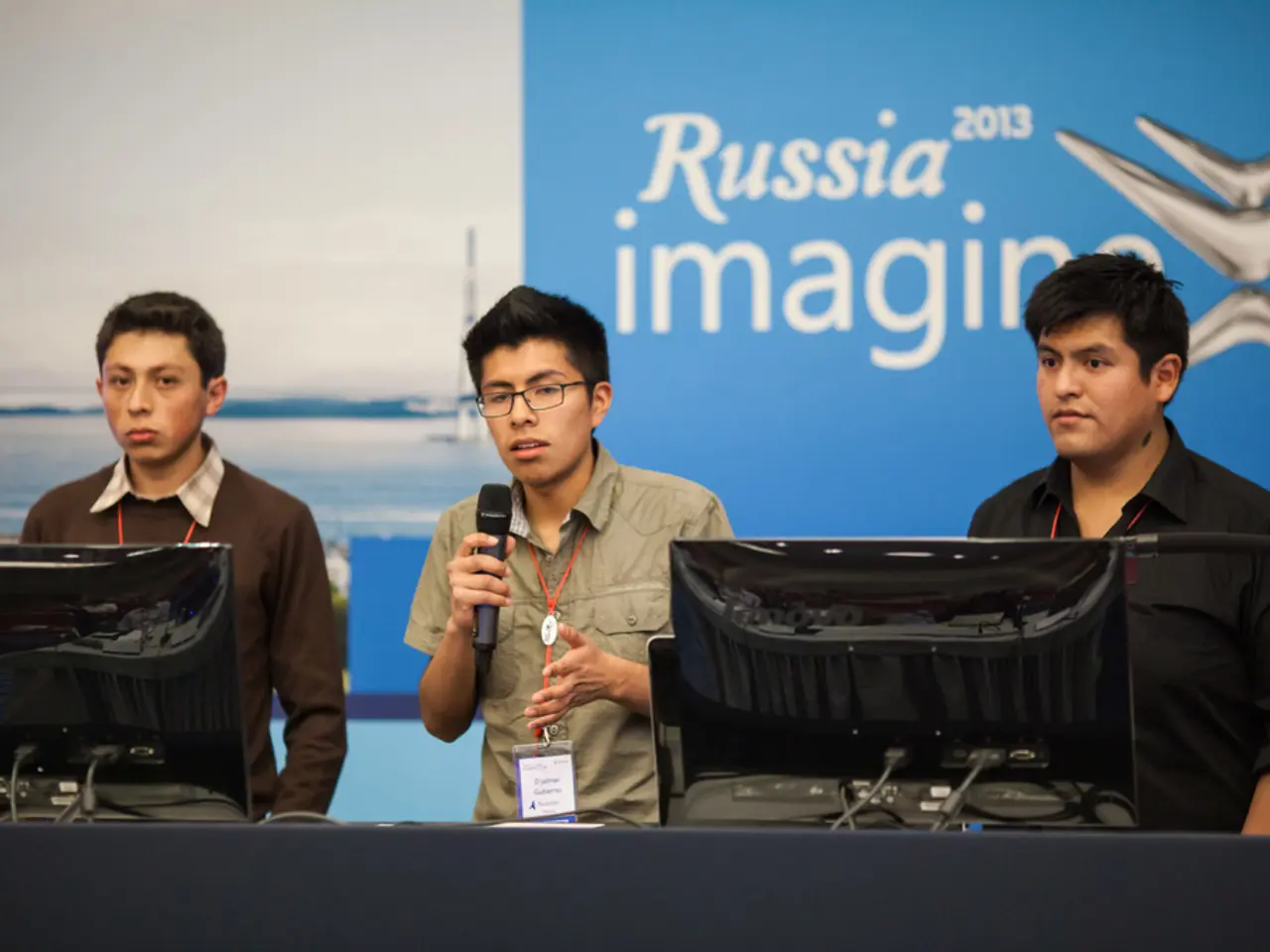Russiajustifies its actions of interfering with European satellite systems as a legal practice
In the ongoing conflict between Russia and Ukraine, the European Union has taken a firm stance, imposing a series of sanctions aimed at curbing Russia's economic resources and military capabilities. The latest round of sanctions, the 18th comprehensive package, targets multiple sectors, including energy, banking, military, shipping, and broader economic activities [1][2][4].
One of the key measures in the energy sector is the lowering of the price cap on Russian oil from $60 to $47.6 per barrel, a move designed to limit Russia's energy revenues that are crucial to financing its war effort [1][2][4]. Additionally, the package bans the purchase, import, or transportation of petroleum products derived from Russian crude oil via third countries, and prohibits providing related technical or economic support [1][2][4].
In the banking and financial sector, the EU has banned specialized financial messaging transactions between EU-based services and 22 additional Russian banks, on top of the 23 previously sanctioned banks [3][4]. It also restricts third-country financial and crypto services supporting Russian sanctions evasion, bans transactions with the Russian Direct Investment Fund and its affiliates, and prohibits the export of banking/financial software to Russia [3][4].
The military and dual-use goods embargo now includes items that could support Russia's military, such as specialized machinery and chemicals for propellants, worth over €2.5 billion [3]. The EU has also sanctioned entities in China and Belarus providing goods to the Russian military, imposed a transaction ban on Belarusian specialized financial messaging services, and embargoed arms imports from Belarus [3].
Over 100 vessels associated with Russia’s “shadow fleet,” which circumvents maritime regulations to export Russian oil and goods, have been sanctioned, and the EU also prohibits transactions through the Nord Stream pipelines [1][2]. The package includes sanctions on individuals involved in indoctrinating Ukrainian children and spreading Russian propaganda, as well as export restrictions on software and technologies enabling Russia’s military and economic activities [3][4].
These sanctions reflect a coordinated effort by the EU and its partners to squeeze Russia's economic resources, financial channels, and military capabilities, aiming to pressure Russia into ceasing its aggression in Ukraine [1][2]. The measures also extend to third countries and entities that facilitate Russia’s sanctions circumvention, including companies from China and Belarus [3].
Meanwhile, tensions persist on the ground, with reports of drone attacks and artillery shelling in eastern Ukraine. In the eastern Ukrainian region of Donetsk, Russian attacks have resulted in two deaths, seven injuries, and damage to 32 residential buildings due to artillery shelling of Kostjantyniwka [5]. Two drone attacks in the city of Kramatorsk have injured a woman and five men [6].
In response to these sanctions, Moscow has been dismissive, with spokesperson for the Foreign Ministry, Maria Zakharova, playing down the impact of new sanctions [7]. Prime Minister Robert Fico of Slovakia, however, has announced that the blockade of the 18th EU sanctions package will be lifted [8].
In a separate development, Russia has been accused of disturbing European satellite communication, targeting commercial and broadcast satellites that support the Ukrainian military [9]. Moscow has downplayed these allegations, seeing new sanctions threats as "banal" [10].
Germany, a key EU member, has also been active in military affairs, with Federal Defense Minister Boris Pistorius announcing plans for a modern and contemporary military service that is meaningful and financially attractive [11]. Pistorius opposes an automatic system for the new military service, fearing it could lead to the partial reinstatement of conscription through executive decision [11].
As the conflict continues, the international community will closely watch the developments in Ukraine and the response from Russia, with the EU sanctions serving as a significant tool in the effort to bring peace to the region.
[1] https://www.reuters.com/business/energy/eu-to-lower-price-cap-russian-oil-60-dollars-per-barrel-2022-07-20/ [2] https://www.bbc.com/news/world-europe-61913652 [3] https://www.reuters.com/world/europe/eu-sanctions-russia-over-ukraine-conflict-2022-07-20/ [4] https://www.nytimes.com/2022/07/20/world/europe/eu-sanctions-russia.html [5] https://www.reuters.com/world/europe/russian-attacks-kill-two-injure-seven-eastern-ukraine-2022-07-20/ [6] https://www.reuters.com/world/europe/two-drone-attacks-injure-woman-five-men-ukraines-kramatorsk-2022-07-20/ [7] https://www.reuters.com/world/europe/russia-sees-eu-sanctions-threats-banal-2022-07-20/ [8] https://www.reuters.com/world/europe/slovakia-to-lift-blockade-eu-sanctions-russia-2022-07-20/ [9] https://www.reuters.com/world/europe/russia-accused-disturbing-european-satellite-communication-2022-07-20/ [10] https://www.reuters.com/world/europe/russia-sees-new-sanctions-threats-banal-2022-07-20/ [11] https://www.reuters.com/world/europe/germany-plans-modern-military-service-without-conscription-2022-07-20/
- In light of the ongoing EU sanctions on Russia, there have been discussions within the community and legislative arenas about modifying the EU's employment policy to support sectors impacted by the sanctions, such as banking, energy, and shipping.
- As geopolitical tensions remain high due to the conflict in Ukraine, the European political landscape emphasizes the importance of policy-and-legislation and policy-and-legislation-related discussions in addressing war-and-conflicts, general-news, and the broader implications for the EU and its member states.








